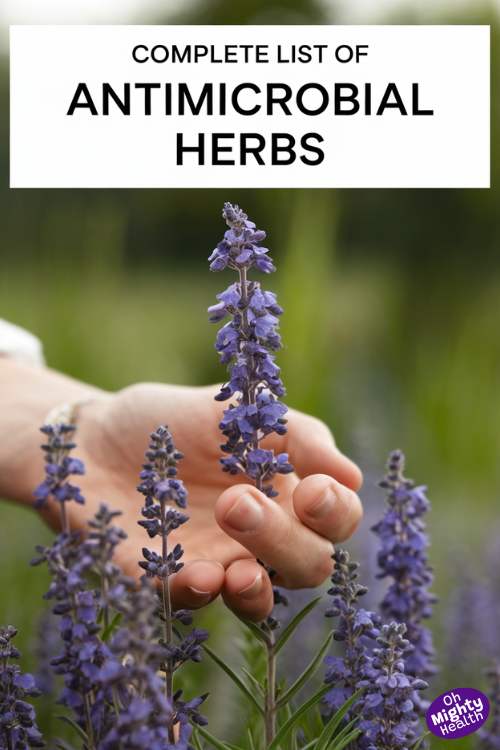Comprehensive List of Antimicrobial Herbs to Keep at Hand + Recipe for DIY Antimicrobial Vinegar
Antimicrobial herbs are herbs that help the body to either kill or disrupt pathogens (pathogens are microorganisms that can cause disease like viruses, fungus or bacteria).
Some antimicrobial herbs will be effective more broadly (ginger is effective against all three pathogens) while others will be effective against a particular pathogen.
Antimicrobial herbs can be used to shorten the duration of a cold or flu and get rid of fungal infections.
Note that antimicrobial herbs are NOT antibiotics. Antibiotics are pharmaceutical and they kill everything in the digestive track (really broad spectrum).

Comprehensive list of antimicrobial herbs
- Achillea millefolium – Yarrow
- Allium sativum – Garlic
- Aloe vera – Aloe (gel)
- Andrographis paniculata – Andrographis
- Arctostaphylos uva-ursi – Bearberry or uva-ursi
- Artemisia spp. – Wormwood, sweet annie, sagebrush
- Baptisia tinctoria – Baptisia or Wild indigo (root)
- Calendula officinalis – Calendula
- Capsicum spp. – Cayenne peppers
- Ceanothus spp. – Redroot (root)
- Commiphora mol-mol – Myrrh (resin)
- Echinacea spp. – Echinacea (root, flower)
- Eucalyptus globulus – Eucalyptus (leaf)
- Hydrastis canadensis – Goldenseal (root)
- Hypericum perforatum – St. John’s Wort
- Hyssopus officinalis – Hyssop
- Inula helenium – Elecampagne (root)
- Isatis tinctoria – Woad (root)
- Juglans nigra – Black Walnut (hull)
- Juniperus spp. – Juniper (needle)
- Lavandula angustifolia – Lavender
- Ligusticum porteri and L. canadensis – Osha species (root)
- Liquidambar styraciflua – Sweet gum (resin)
- Lonicera japonica – Honeysuckle
- Lomatium dissectum – Lomatium
- Mahonia spp. – Oregon grape (root)
- Melissa officinalis – Lemon balm
- Mentha piperita – Peppermint (leaf)
- Mondarda spp. – Bee balm, wild bergamot
- Ocimum sanctum – Holy basil or Tulsi
- Origanum vulgare – Oregano
- Pimpinella anisum – Anise
- Rosmarinus officinalis – Rosemary
- Salvia officinalis and S. aparine – Garden sage and White sage
- Scutellaria baicalensis – Baikal skullcap
- Sambucus canadensis and S. nigra – Elderberry (flower & fruit)
- Spilanthes acmella – Herb for toothaches
- Syzygium aromaticum – Clove (bud)
- Tanacetum vulgare – Tansy
- Thymus vulgaris – Thyme
- Usnea spp. – Usnea lichen
- Verbascum thapsus – Mullein
- Xanthorhiza simplicissima – Yellowroot
- Zingiber officinale – Ginger (root)
When to use antimicrobial herbs
Antimicrobial herbs can come in handy when your body needs a little extra help fighting off harmful bugs. They’re great for:
- Colds and Flu: Herbs like Echinacea or Ginger can give your immune system a boost and help you recover faster.
- Viral Infections: Whether it’s a cold sore or something like the flu, herbs like Lemon Balm and Oregano may help stop viruses in their tracks.
- Bacterial Infections: Garlic and Goldenseal are great natural options to tackle bacterial infections and keep things in check.
- Fungal Infections: Got a fungal infection? Herbs like Thyme or Calendula can help clear it up and soothe your skin.
- Digestive Woes: If your tummy is upset from bacterial imbalances, Peppermint and Fennel can help ease the discomfort and get things back to normal.
These herbs are your natural helpers when it comes to everyday infections, but it’s always a good idea to check with a healthcare professional if you’re unsure.
How to Use Antimicrobial Herbs
You can use antimicrobial herbs in lots of simple and effective ways, depending on what you’re trying to address. Here are a few easy methods to try:
- Teas or Infusions: Make a comforting cup of tea by steeping herbs like Thyme or Rosemary in hot water. This can help soothe colds and fight infections.
- Tinctures: These are alcohol-based extracts of herbs like Echinacea or Garlic. Just a few drops can give your immune system a little extra boost when you’re fighting off a bug.
- Poultices or Compresses: Got a skin infection or wound? Try applying a poultice with herbs like Calendula or Lavender directly to the skin to help speed up healing.
- Essential Oils: You can dilute essential oils like Lavender or Tea Tree in a carrier oil and apply them to the skin for fungal or bacterial infections.
- Inhalation: Feeling stuffy? Steaming with herbs like Eucalyptus can help open up your airways and clear out respiratory infections.
Just remember, it’s always a good idea to check in with a healthcare provider before starting something new, especially if you’re dealing with a health condition.
This post has affiliate links which means I will earn money if you purchase through them at no extra cost to you. See my disclaimer policy.
Make Your Own Antimicrobial Vinegar Cleaner with Only 3 Ingredients
This antimicrobial cleaner is VERY easy to make!
It is a great 100% natural herbal cleaner very effective for cleaning your kitchen countertops, kitchen, sink, windows and in the bathroom. This cleaner will cut through grease easily! And it smells superb. Here’s what you need to make it:
- 4 cups distilled white vinegar (a natural disinfectant – vinegar is probably the only cleaner you’ll ever need) – get it here
- 1.5 cups dried thyme leaves – get it here
- 1.5 cups dried lavender buds – get it here
- 12 drops rosemary essential oil – get it here
To make your antimicrobial cleaner place the thyme and lavender in a mason jar (you can get it here). Fill the rest of the jar with the distilled white vinegar. Make sure to cover with a plastic lid (NOT a metal lid) and let it sit for around 24 hours.
After the time has passed strain out the vinegar, bottle up (you can get the bottles here) and add the 12 drops of rosemary essential oil.
Always shake well before using so the oil mixes with the rest of the liquid (otherwise it will sit at the top).
Patri xx
